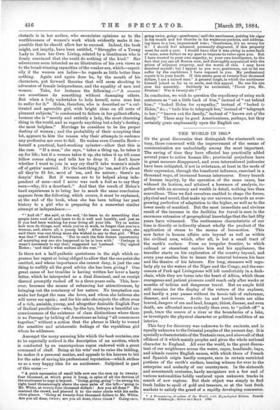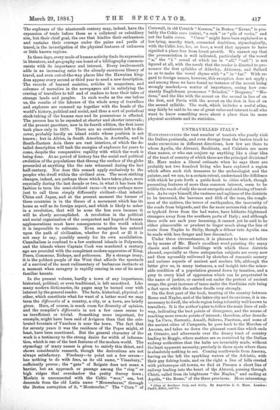THE WORLD IN 1883.* OF the great discoveries that distinguish
the nineteenth cen- tury, those concerned with the improvement of the means of communication are undoubtedly among the most important. The saving of time they have effected has practically added several years to active human life ; provincial prejudices have in great measure disappeared, and even international jealousies have been mitigated, if not in substance, at least in the mode of their expression, through the beneficent influence, exercised in a thousand ways, of increased human intercourse. Every branch of human inquiry, by the operation of the same cause, has widened its horizon, and attained a keenness of analysis, to- gether with an accuracy and wealth in detail, nothing less than marvellous. Thus we find, ourselves enabled to shape the forces, physical and moral, that make up our universe, towards an ever- growing perfection of adaptation to the higher, as well as to the lower needs of mankind. But the most immediate and obvious result of the increase in the facilities for travel is seen in the enormous extension of geographical knowledge that the last fifty years have witnessed. The restlessness characteristic of our time is directly or indirectly almost wholly the product of the application of steam to the means of locomotion. This new factor in human affairs acts beyond as well as within the civilised area, which, after all, is but a small tract of the earth's surface. From an irregular frontier, to which railroad or steamboat carries him and his appliances, the traveller starts on his exploration of the country beyond, and every year enables him to lessen the interval between his base and the theatre of his labours. Ere long, steamers will regu- larly ply on the waters of the Niger and the Congo, and the suc- cessors of Park and Livingstone will loll comfcrtably in a deck. chair, while they are borne into the heart of Africa, which those courageous and patient pioneers could reach only after weeks or months of tedious and dangerous travel. But an ample field still remains for the display of the virtues of the explorer, and hardly a year passes without its heroic tale of endurance, disaster, and success. Arctic ice and torrid heats are alike braved, dangers of sea and land, hunger, thirst, disease, and even death, are affronted more ardently than ever, to "polish off" a peak, trace the source of a river or the boundaries of' a lake, or investigate the physical character or political condition of an interior.
This fury for discovery was unknown to the ancients, and is equally unknown to the Oriental peoples of the present day. It is specially a characteristic of the Teutonic race, and above all of that offshoot of it which mainly peoples and gives the whole national character to England. All over the world, to the great discon- tent of our neighbours across the water, capes, headlands, bays, and islands receive English names, with which those of French and Spanish origin hardly compete, save in certain restricted portions of the earth's surface, bearing witness for ever to the enterprise and audacity of our countrymen. In the sixteenth and seventeenth centuries, hardy navigators not a few and of various nationalities boldly ventured upon unknown tracks in search of new regions. But their object was simply to find fresh Indies to spoil of gold and treasure, or at the best fresh markets to satisfy the greed of a rapidly developing commerce.
• A Pronouncing G,Jtetteer of the Worti, ilia Etymological Notices. Fourth
E3ition. Edinburgh: Oliver anl Boyd. 1883.
The explorers of the nineteenth century may, indeed, have the expansion of trade before them as a collateral or subsidiary aim, but their chief goal, the one that kindles their enthusiasm and sustains their courage under the pains and perils of travel, is the investigation of the physical features of unknown or little known regions.
In these days, every mode of human activity finds its expression in literature, and geography can boast of a bibliography commen- surate with its importance and interest. Every twelvemonth adds in an increasing ratio to the already enormous library of travel, and even out-of-the-way places like the Hawaiian king- dom appear every second or third year to need a new description. The records of learned societies, articles in magazines, and columns of narrative in the newspapers aid in satisfying the craving of travellers to tell and of readers to hear their tales of strange lands and peoples. In such works as the one before us, the results of the labours of the whole army of travellers and explorers are summed up together with the heads of the world's history, political and social, and thus a sort of periodical stock-taking of the human race and its possessions is effected. The process has to be repeated at shorter and shorter intervals ; of the present gazetteer, now in its fourth edition, the first issue took place only in 1879. There are no continents left to dis- cover, probably hardly an island exists whose position is not known ; bat in Africa, in South America, in Australia, and in South-Eastern Asia there are vast interiors, of which the de- tailed description will task the energies of explorers for years to come, despite the comparative rapidity with which the work is being done. At no period of history has the social and political evolution of the populations that throng the surface of the globe proceeded at anything like the rate witnessed during the last half-century. Nor does this remark apply exclusively to the peoples who dwell within the civilised area. The most striking -changes, indeed, are perhaps those which have taken place, more especially during the last decade or two, in what it has been the fashion to term the semi-civilised races—it were perhaps more just to call them simply differently civilised—that inhabit China and Japan, and at the present moment the former of these countries is in the throes of a movement which has its home as well as its foreign aspect, and which is likely to usher in a revolution, that will be none the less sure because it will be slowly accomplished. A revolution in the political and social organisation of the compactest and hugest of human agglomerations must have consequences to the world which it is impossible to estimate. Even savagedom has entered upon the path of civilisation, whether for good or ill it is not easy to say, possibly merely for its own annihilation. Cannibalism is confined to a few scattered islands in Polynesia, and the islands where Captain Cook was murdered a century ago are provided with the completest modern apparatus of King, Peers, Commons, Bishops,' and policemen. By a strange irony, it is the politest people of the West that affords the spectacle of a survival of the most rudimentary of barbarous instincts at a moment when savagery is rapidly ceasing in one of its most familiar haunts.
In the present volume, hardly a town of any importance, historical, political, or even traditional, is left unnoticed. Like many modern dictionaries, its pages may be turned over with interest by the general reader. The facts, historical, physical, or other, which constitute what for want of a better word we may term the differentia of a country, a city, or a town, are briefly given. Here, of coarse, is much room for diversity of opinion, and the compiler's differentia in not a few cases seems to us insufficient or trivial. Something more important, for example, might have been said of Avignon than that the cele- brated fountain of Vaucluse is near the town. The fact that for seventy years it was the residence of the Popes might, at least, have been mentioned. But the general character of the work is a testimony to the strong desire for width of Informa- tion, which is one of the best features of the modern world. The etymology of many names is given to satisfy this thirst, and shows considerable research, though the derivations are not always satisfactory. Finsbury—to point out a few errors— has nothing to do with fens, as its old name, " Vinesbnry," sufficiently proves ; the " gate " of Reigate does not mean a barrier, but an approach or passage among the " ricg " or high ridges that overshadow the pretty Surrey town ; tforlais is unconnected with the Celtic " mor," sea, but descends from the old Latin name " Monsrelaxas," through the Breton corruption of it, " Montroulez." The " Corn " of Cornwall, in old Cornish " Kernou," in Breton " Kerne," is pro- bably the Celtic earn (cairn), "a rock" or "pile of rocks," and not the Latin cornu. " Carse" might have been explained as a low-lying, marshy tract, connected doubtless, etymologically, with the Celtic kar, her, or kaer, a word that appears to have signified a place free from forest growth. We cannot say that the pronunciation is well indicated, particularly of the vowel "a," the "h" sound of which (as in "all," "call ") is not figured at all, with the result that the reader is directed to pro- nounce the first syllables of Alderley, Alderney, and Salford so as to make the vowel rhyme with " a " in "far." With re- gard to foreign names, however, this exception does not apply ; and among them we have found no instance of the accent being wrongly marked,—a matter of importance, seeing how con- stantly Englishmen pronounce "Brindisi," "Bergamo," "Mo. dena," and the like with the accent on the second in lieu of on the first, and Pavia with the accent on the first in lieu of on the second syllable. The work, which includes a useful atlas, may fairly be said to be one of great value and interest to all who want to know something more about a place than its mere physical accidents and its statistics.



































 Previous page
Previous page